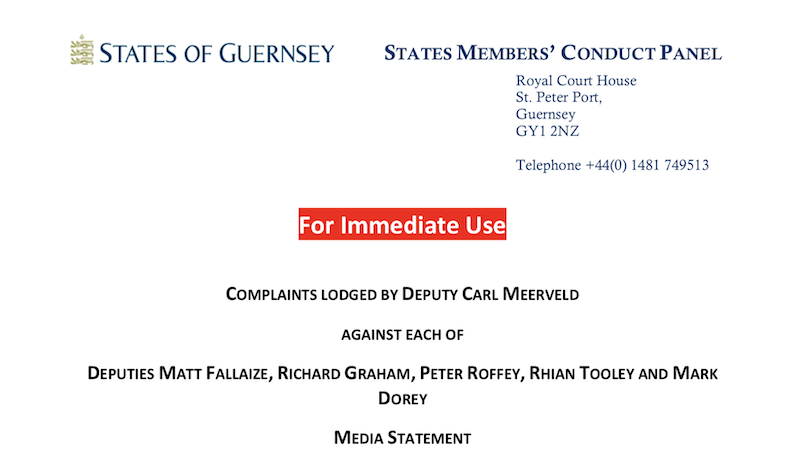


An email Education President Matt Fallaize sent to his Committee's Chief Secretary, which threatened her with a vote of no confidence, has been found to be disrespectful and discourteous by an independent panel.
The email on 17 April 2019 was sent to the Committee's then Chief Secretary Colette Falla and cc'd in other members of the committee, Policy & Resources President Gavin St Pier and States Chief Executive Paul Whitfield.
Deputy Fallaize sent the email to Ms Falla after they interviewed candidates for the role of Head of Curriculum and Standards. All members of the interview panel, apart from Deputy Fallaize, voted to appoint a local headteacher into the role.
He disagreed, preferring Clare Sealy, who has now taken up the position. Following the final interviews, Ms Falla contacted the candidates with the outcome of their applications.
In an email to Ms Falla following that decision, Deputy Fallaize said: "Today, in making the decision you have and therefore disregarding agreements made previously between the Committee and the Service, you have acted in a way I sense is very likely to result in the Committee expressing no confidence in you as Chief Secretary. Some members have speculated about doing so before now and I have steered us away from it, but I can do so no longer.

Pictured: Deputy Matt Fallaize has responded to the Code of Conduct Panel's verdict. His statement is published later in the story.
"Whatever the governance arrangements around appointments, no Chief Secretary should act in a way which plainly and knowingly obstructs their Committee's agreed policy agenda. This is what you have done today."
The originally successful candidate later retracted her acceptance of the job, while Ms Falla ceased to be the Committee's Chief Secretary and took up a different job within the States.
Former Education Vice-President Carl Meerveld reported Deputy Fallaize and the rest of his Committee to the Code of Conduct back in August. The outcome of those allegations has only been published now.
On most counts, Deputy Meerveld's claims were dismissed by the panel.
However, Deputy Fallaize was found to have breached Section 9 of the States' Members Code of Conduct, which reads that: “Members shall at all times treat other Members, Civil Servants and members of the public with respect and courtesy...”
The panel said: "In respect of Deputy Fallaize, the Panel concluded that the e mail which Deputy Fallaize had sent to the then Chief Secretary of the Committee for Education, Sport & Culture was ill-judged and could be perceived as not treating the recipient with respect and courtesy."

Pictured: The full statement can be read here.
The panel said Deputy Fallaize had been naive rather than malicious in thinking he could engineer the appointment of Ms Sealy.
"The Panel was concerned that, in believing that matters could be arranged to ensure that a particular person could be appointed, Deputy Fallaize appeared not to be fully aware of the implications of the Civil Service Code nor of the constraints under which Deputies and civil servants operate which was a breach of the Code.
"However, although he was unhappy with the outcome of the interview process for the position of Head of Curriculum and Standards (which led to the aforementioned email being sent) because he had expected and assumed that a particular person would be appointed to the position, he had not required that to happen."
In doing so, he failed to "uphold the political impartiality of the Civil Service", breaching Section 10 of the Code.
In a statement following the publication of the Panel's conclusions, Deputy Fallaize said his breaches were "minor" and that Deputy Meerveld's accusations were "at best a fishing expedition and at worst vexatious".
"Deputy Meerveld made a very serious allegation that I had required civil servants to act in conflict with their Code of Conduct. In its written findings, the Panel was very clear to point out that I did not require the appointment of any candidate to the role in question nor require any official to break his or her Code of Conduct, as Deputy Meerveld wrongly alleged," he said.

Pictured: Deputy Meerveld's complaints took seven months to be handled.
"The Panel found that I had done nothing to bring the States into disrepute nor to offend the principle of acting with objectivity, as Deputy Meerveld also wrongly alleged.
"The case Deputy Meerveld submitted was based largely on media reports and a few dozen anonymous posts on social media. The most serious allegations were at best a fishing expedition and at worst vexatious. The Code of Conduct should not be turned into a weapon to use against a Committee with which another deputy has political disagreements. Political disagreements are healthy, but they need to be left at the door of the States’ chamber.
"Deputies and former deputies and those who would like to be deputies might like to reflect on the wisdom of using the Code to pursue their political disagreements and personal rivalries. Doing so undermines the Code and puts the Panel in an extremely difficult position.
"The Panel decided that I was in breach of the Code in a minor way for two reasons. I sent an email to an official which I accept was intemperate and the Panel found that I was not sufficiently familiar with the Civil Service Code of Conduct. Where the Panel considers any breach to be minor in nature, they issue a caution, and that is what they have done in this case. I have accepted the Panel’s caution."
Pictured top: Deputy Matt Fallaize and Frossard House.
Comments
Comments on this story express the views of the commentator only, not Bailiwick Publishing. We are unable to guarantee the accuracy of any of those comments.